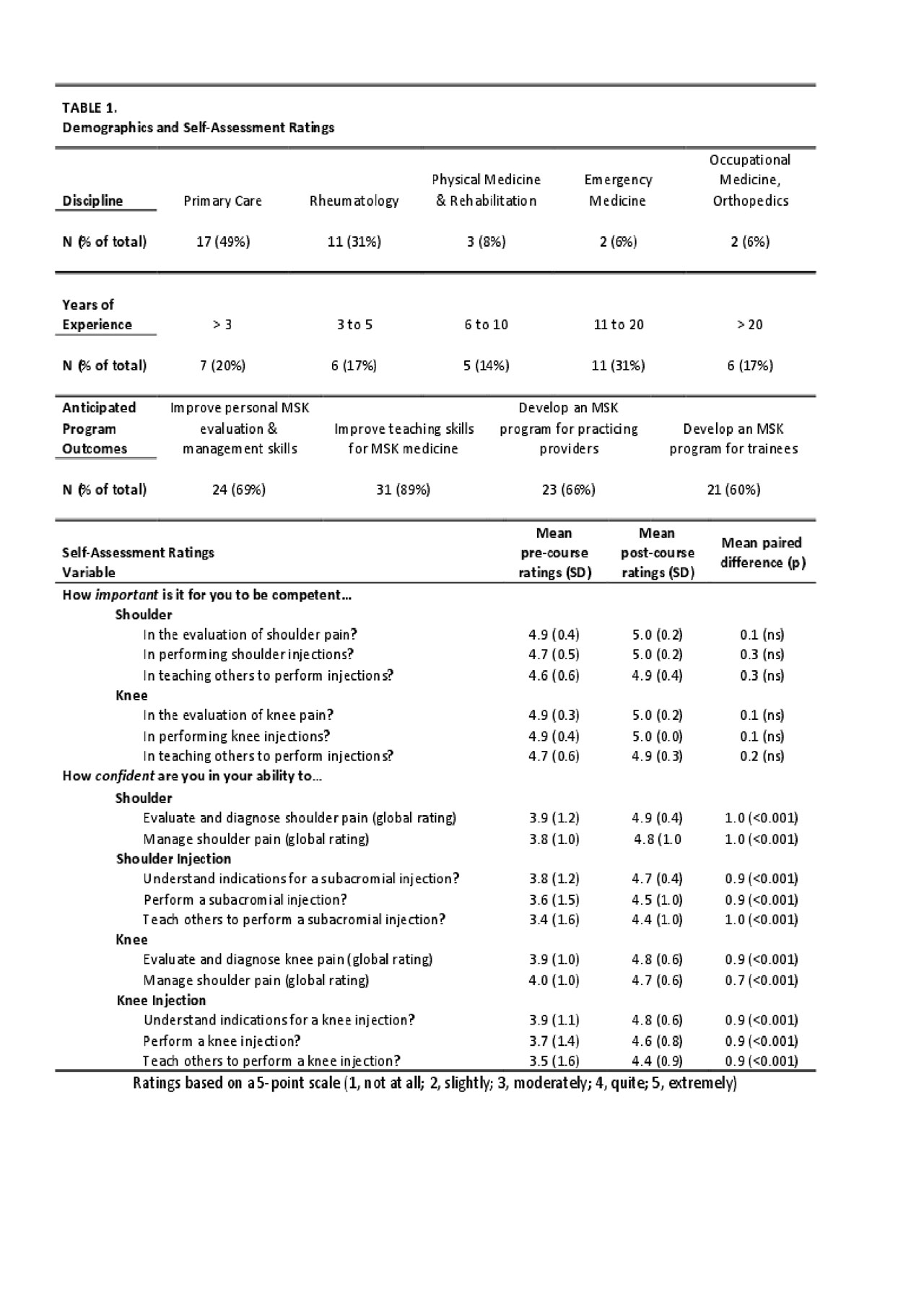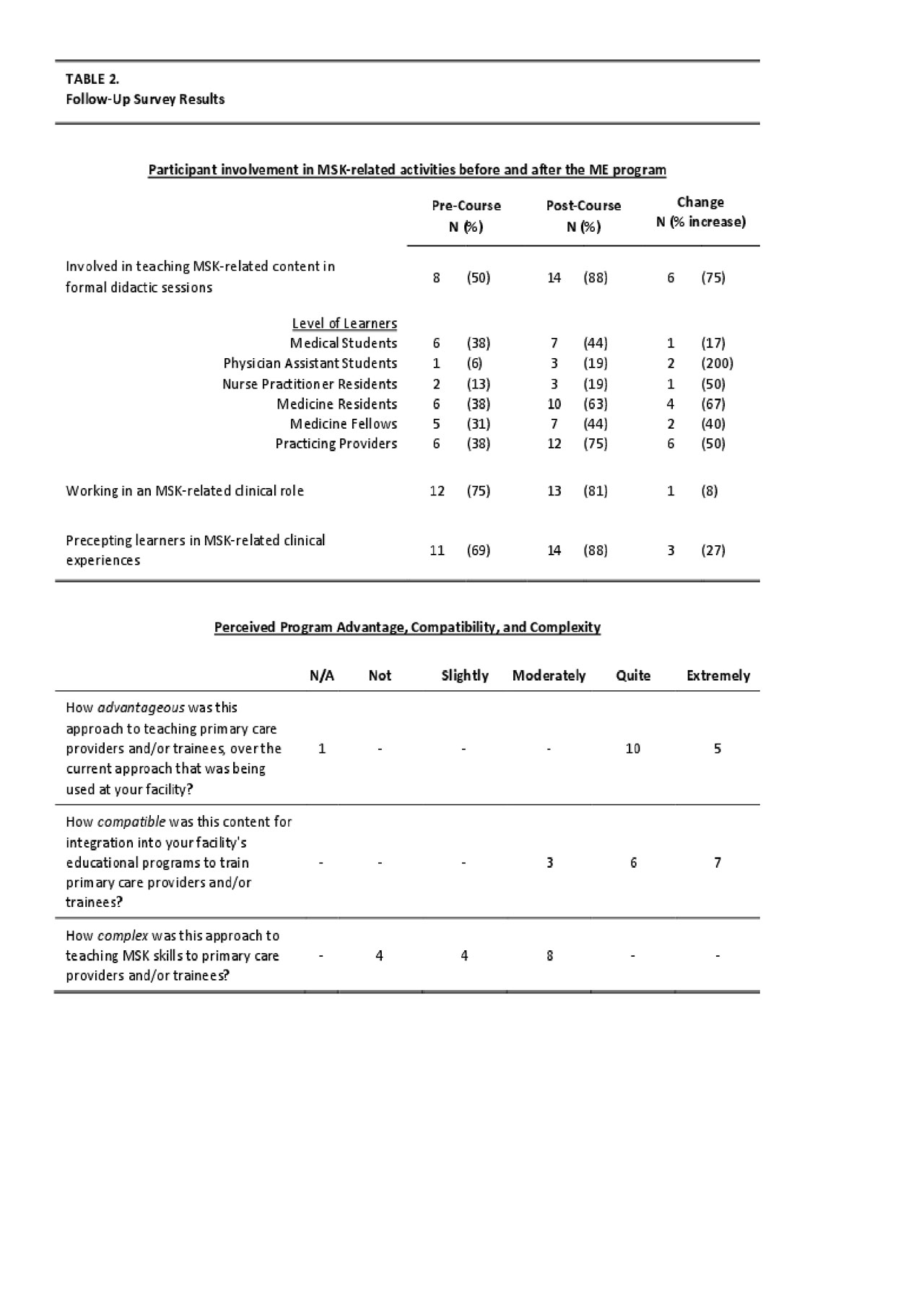Session Information
Date: Sunday, November 10, 2019
Title: Education Poster
Session Type: Poster Session (Sunday)
Session Time: 9:00AM-11:00AM
Background/Purpose: Since 2011, the Veterans Administration (VA) has supported musculoskeletal (MSK) training programs to facilitate provider and trainee MSK education, including a national health professions education (HPE) faculty development course – the MSK Master Educator (ME). The ME program, offered through VA Simulation Learning, Education and Research Network (SimLEARN), was created to teach educators how to systematically train primary care providers and trainees in MSK medicine. The program includes a portable curriculum to be used at ME participants’ home institutions. Program development and pilot testing has been previously described. Herein, we describe the long-term effects of the ME training program on the first cohort of learners from 2017-2018.
Methods: The 2.5 day ME program included didactic presentations designed to teach primary care providers how to evaluate and manage shoulder and knee pain, reinforced by a 2-station OSCE. On the final day, participants rotated through an objective structured teaching experience (OSTE) to practice the roles of teacher, student and simulated patient.
Participant evaluation included written surveys assessing learning goals and perceptions of confidence both before and immediately following the training. In 2019, a follow-up survey was developed. The survey collected information about participants’ current work environment and any MSK-related duties that may have changed since participation in the ME program. Additionally, the survey collected perceptions about the ME course content and its importance in preparing participants to teach MSK knowledge to other providers. Individual emails with survey links were sent to 31 ME participants (4 excluded with no active email address).
Results: The ME program was held on 6 occasions from 2017 to 2018. Thirty-five learners participated (29 physicians, 5 nurse practitioners, 1 physician assistant). Demographic information and self-assessments collected immediately before and after the program are presented in Table 1. There was a significant increase in all post-course self-assessments of confidence, including the ability to teach shoulder and knee injections.
Sixteen follow-up surveys were completed in 2019 (52% response rate) by 14 physicians, 1 nurse practitioner and 1 physician assistant. Table 2 includes practice changes for MSK-related educational activities and perceptions of program advantage, compatibility and complexity. Participant evaluation of the importance of each ME course elements in preparing them to teach future MSK content are represented in Table 3.
Conclusion: The ME program is a national HPE faculty development course that attracts strong multidisciplinary educators and results in improved self-perception of MSK teaching abilities. Participants have reported an improvement in MSK teaching manifested by an increase in their local educational responsibilities in didactic and clinical settings. The curriculum was rated as advantageous and compatible with local programs, and feasible to integrate. To continue the effectiveness of this program, local institutions should support more educators to participate in this VA sponsored program.

ME Table 1 – Self-Assessment Ratings
To cite this abstract in AMA style:
Barker A, Anderson T, Brahaj A, Chandrasekaran D, Hansen A, Hansen K, Hearth-Holmes M, Hubbard L, Kim L, Lazzari A, Mckie R, Miller P, Obrien J, Osting V, Sayeed Y, Siaton B, Sully K, Wiltz S, Battistone M. VA Musculoskeletal “Master Educator” Faculty Development Program for Health Professions Educators: Follow-Up on Changes in Educational Duties and Perceptions of Program Content [abstract]. Arthritis Rheumatol. 2019; 71 (suppl 10). https://acrabstracts.org/abstract/va-musculoskeletal-master-educator-faculty-development-program-for-health-professions-educators-follow-up-on-changes-in-educational-duties-and-perceptions-of-program-content/. Accessed .« Back to 2019 ACR/ARP Annual Meeting
ACR Meeting Abstracts - https://acrabstracts.org/abstract/va-musculoskeletal-master-educator-faculty-development-program-for-health-professions-educators-follow-up-on-changes-in-educational-duties-and-perceptions-of-program-content/


